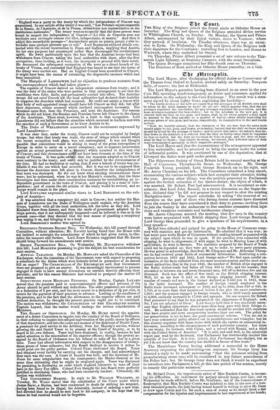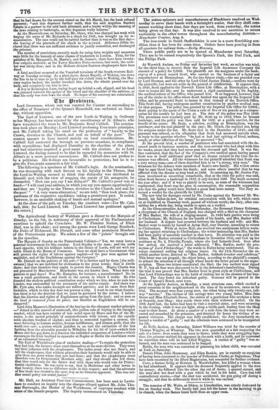Zbt Biletropolis.
The Lord Mayor, after discharging his official duties as Conservator of the Thames from Oxford to London, arrived safely on Saturday. Banquets daily, of course; the last at Richmond.
The Lord Mayor's attention having been directed to an error in the new Corn Bill, operating disadvantageously on dealer and consumer, applied for information on the subject to the Corn Exchange. ' The result was a state- ment signed by about eighty firms, explaining the hardship-
.. The fourth section of the new act enacts that the averages of all British corn shall be taken in the same manner as Uhatr the old act; which manner was, that the rye averages regulated the rye-duties, the pea averages regulated the pea-duties, and the bean averages regulated the bean-duties : but in the schedule to the new act, it Is ordered that the duty on rye, peas, and beans, shall be for every quarter a duty equal In amount to the duty payable on a quarter of bar'ey—thus totally neglecting the average prices of rye, peas, and beans, respectively, in contradiction to the said fourth section.
"Now, we humbly submit, that the Intention of the act was that the same scale should apply to rye, peas, and beans, as to barley, but not that the duty on these articles should be levied by the average of barley: and to prove this latter, we submit, that fur- ther down in the schedule it is ordered that the duty on barley-meal shall be regulated by that on barley, bat the duty on rye-meal by that on peas, and the duty on bean' meal by that on beans ; thus clearly showing, we submit, that different rates of duty were contemplated agreeably to their respective averages."
The Lord Mayor said that the inconsistency of the arrangement appeared to him undeniable; and he promised to bring the matter under the notice of influential parties. It was mentioned by one of the deputation, that at Liverpool the duties were paid under protest.
The Shipowners Society of Great Britain held its annual meeting at the Hall of Commerce, Threadneedle Street, on Wednesday. Mr. George Frederick Young, presided; Lord George Bentinck sat on his right, and Mr. Aaron Chapman on his left. The Committee submitted a long report, enumerating the various subjects which had occupied their attention during the year. Among other things, was the petition presented to Parliament against the further redaction of the timber-duties; the object of which, it was asserted, Sir Robert Peel had misconceived. It is mentioned as con- solatory, that Lord John Russell, in a recent discussion on the Sugar-du- ties, declared that "he did not propose in any respect to alter the existing Navigation-laws." The report concludes by asking "the renewal of co- operation on the part of those who during recent contests have dissented from the course they have considered it their duty to pursue; inviting them to join the Society in the endeavour to free maritine commerce from injni- rious and vexatious restraints and burdensome charges."
Mr. Aaron Chapman assured the meeting, that few men in the country were better acquainted with British shipping than Lord George Bentinck, Lord George then proceeded to give a specimen of his acquirements, in, long long speech— He had been ridiculed and quizzed for going to the House of Commons cram- med with statistics and got-up information. He admitted that it was true: he had never gone to the Home of Commons without making himself acquainted with the subject upon which he was to speak. If the question were connected with shipping, he went to shipowners; if with sugar, he went to Mincing Lane; if with agriculture, he went to farmers. The statistics prepared by the Board of Trade could not be depended on: they were got up to order, to serve party purposes. He was proud to acknowledge, that from Mr. Chapman and Mr. Alderman Thomp- son he had received great funds of commercial information. Instituting a com- parison between 1839 and 1845, Lord George said—" We find upon careful ex- amination of the facts collected from the most accurate sources and the most com- petent authorities, that in the year 1845, the number of British ships engaged in the Baltic timber-trade had fallen off from 660 to 640; and the seamen, that amounted to between six and seven thousand men, fell off to between five and six thousand. Such was the effect of free trade on the British shipping interest. Well, let us see how it told on the foreign shipping interest. While the number of vessels and men in the former declined as I told you in 1845, those in the latter increased. The number of foreign vessels employed in the Baltic trade increased subsequent to 1842, and up to 1845, from 630 or 640, to 1,700, or to more than that number—I believe I can give the exact number—to 1,895; and the seamen engaged in foreign vessels, who in 1839 barely amounted to 6,000, suddenly increased to 17,000 and upwards. On one occasion Sir Robert Peel presumed to say that he was ashamed of the shipowners of England: now, Sir, I am not ashamed of them." Lord George held that it was absolutely neces- sary that English shipowners should more than keep pace with their foreign ri- vals. He contended that the free-trade system should be avoided with countries that have greater and more overpowering marines than our own. The policy foe our preservation is not to have one great commercial scheme. "You are not to have your commercial policy allotted out in narallelograMS and triangles; but let this country negotiate with those states with which she carries on commercial in- tercourse, according to the circumstances of each particular country. Let there be one treaty, for instance, with China, and a second with Russia, and a third with the United States of America." "It is said, and said well, in the admirable report just read by the Secretary, that Parliament has irretrievably decided this question of free trade. It is true, indeed, that Parliament has decided, but as yet I do not know that the Country has decided in favour of free trade."
The Marylebone Vestry having addressed a memorial to the Home Secretary respecting the advertising-van nuisance, Sir George Grey has directed a reply to be made announcing "that the nuisance arising from perambulating street vans will be considered in any future amendment of the Police law; but Sir George Grey does not think it would be expedient to introduce into Parliament a bill, at this late period of the session, merely to remedy this particular nuisance."
Mr. Richard Dunn, the importunate suitor of Miss Burdett Cants, is increas- ing his difficulties. An indictment for perjury already hangs over him; and on %Wednesday he made affidavit, before Mr. Goulburn, one of the Commissioners of Bankruptcy, that Miss Burdett Coutts was indebted to him in the sum of a hum.. died thousand pounds, the lady having bound herself in writing to allow Mr. Doan to draw upon Contts and Co. for such a stun of money as he should think a fair compensation for the injuries and imprisonments he had experienced at her hands; that he had drawn for the amount stated OD the 4th March, but the bank refused payment; yment; "and this deponent further saith, that the said Angelina Burdett is a partner in the said bank aforesaid, and a trader within the meaning of the laws relating to bankrupts, as this deponent verily believes."
At the Mansionhonse, on Saturday, Mr. Dunn, who was charged last week with forging the name of Mr. Rickards to a check for 2481., was brought up for re- examination. The case could not be carried further than it was on the first day— the tracing of the proceeds of the check to the accused. Alderman Gibbs de- clared that there was not sufficient evidence to justify committal, and discharged be prisoner.
The number of convictions recently made for using false weights and measures says little for the honest' of some classes of tradesmen in London. Thus, for the parishes of St. Margaret s, St. Martin's, and St. James's, there have been twenty- four culprits mulcted; at the Tower Hamlets Petty-sessions, last week, the num- ber was thirty-four; and in the Holborn division fourteen shopkeepers have been fined. A fatal accident occurred at the Vauxhall terminus of the South-western Rail- way on Tuesday evening. As a plate-layer, James Begally, of Woking, ran down the line to be in time to go by the half-past six o'clock train to Woking, the Mer- cury engine backed, the tender knocked him down, the wheels passed over his body, and completely cut him in twa.
A boy in Kennington Lane, trying to get up behind a cab, slipped, and his head was jammed between the spokes of the wheel and the shoulder of the axletree, so that his scalp was torn from the skull. No hopes of his recovery are entertained.



























 Previous page
Previous page